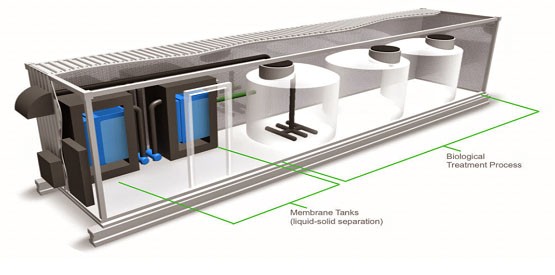A Sewage water treatment plant can be applied in big industries as well as at residential properties of the minuscule level. The plant installed at residential properties are for only a fewer number of people and so is known as a Domestic Sewage Water Treatment Plant. These plants are installed to prevent water scarcity in areas or properties currently facing one. Domestic sewage substantially includes the waste in the form of paper, food, wastewater of bathroom and sink, human waste and alike. It is necessary to remove all these waste before letting the wastewater out in the environment. The treated water won’t go to waste has it will be clean to reuse. This will help develop a sustainable and eco-friendly environment and will help to save water for our future generations.
Sewage water treatment plant can remove all major contaminations from water in spite of them being solid or really tiny. For this, the domestic plant follows a process to attain quality treated water.

1. Sedimentation
This is the primary stage of the water treatment process. In this stage, the water is released in the tanks for some period of time, allowing the solid waste to decompose at the bottom of the tank. This will result in a sludge that can be scraped off or pumped out into a separate facility, to be treated further. The tank will have oils and grease as residue, floating on top of the surface which can be easily removed.
2. Breaking Down of the Contaminants
The next stage after sedimentation involves breaking down of the contaminants. This is done by exposing the sludge to oxygen. This is a crucial biological process as it allows the bacterias to break down the contaminants. This may result in remains in solid nature. These can be assorted into two types of systems:
- Fixed Film Filtration- It uses a mix of filtrations and collects the remains on a growth medium.
- Suspended Growth Systems- It mixes the sludge with the microbes, such that the waste can be transformed into a solid state.
3. Improve the Quality of Water Through Sand Filtration
The third stage involves improving the quality of water through sand filtration. This achieved through a mix of techniques along with sand filtration. A unique step in this process lets the aquatic plant grow inside these waters, in order to remove remaining particles and excess phosphorus and nitrogen.
4. Disinfection
This is the last stage of a domestic sewage water treatment plant. In this stage, many disinfecting substances are added into the water in order to remove the remaining microorganisms. This step uses methods like chlorine light, ozone light, ultraviolet light, making the water ready to be returned into the environment.
Methods of Disinfection:
- Chlorine- Even though being the most common method used, Chlorine poses as a threat to our health.
- Ultraviolet- It is highly efficient in killing the bacterias but they might still remain in the water due to the presence of solids.
- Ozone- Ozone is the safest option but not many choose it as it is costly.
After this step, the sludge will be heated in this stage. This will make the water ready for agricultural processes by killing the remaining pathogens in the water.
Our wastewater includes several harmful infectious organisms that cause some serious damage to our eco-system around us and thus, harming us as well. Remove them all before they pollute the environment near you with a domestic sewage water treatment plant.
Frequently Asked Questions (FAQs) About Domestic Water Treatment Plant
1. What is a domestic water treatment plant and why is it important for households?
A domestic water treatment plant is a system designed to treat wastewater generated within a home, including sewage and greywater, to make it safe for disposal or reuse. It is important because it helps protect the environment by preventing untreated sewage from polluting local water bodies, reduces health risks by removing harmful contaminants, and promotes sustainable water use by enabling treated water to be reused for non-potable purposes such as gardening or flushing toilets.
2. How does a domestic sewage water treatment plant work?
A domestic sewage water treatment plant typically operates through multiple stages including preliminary screening, sedimentation, biological treatment, and disinfection. Wastewater from the home enters the system, where solids and large particles are removed first. Then, biological processes involving beneficial bacteria break down organic matter. Finally, the treated water undergoes disinfection to eliminate pathogens before it is discharged or reused, ensuring it meets safety standards.
3. What types of wastewater can a domestic water treatment plant handle?
Domestic water treatment plants are designed to handle sewage and greywater from everyday household activities such as bathing, washing dishes, laundry, and flushing toilets. These plants can treat organic waste, suspended solids, oils, detergents, and pathogens commonly found in domestic sewage, making the treated water safe for either discharge into the environment or reuse within the home premises.
4. What are the key benefits of installing a domestic water treatment plant at home?
Installing a domestic water treatment plant provides numerous benefits including reducing the environmental impact of household sewage, lowering water bills by enabling water reuse, complying with local environmental regulations, and promoting healthier living conditions by preventing the spread of waterborne diseases. It also adds value to the property by incorporating sustainable infrastructure.
5. How much space is required for installing a domestic water treatment plant?
The space required for a domestic water treatment plant varies depending on the capacity and design of the system. Typically, for an average household, these plants require a compact footprint that can be installed underground or in a dedicated area within the property. Modern systems are designed to be space-efficient and can fit into small yards or basements without disturbing daily household activities.
6. Is a domestic water treatment plant easy to operate and maintain?
Yes, most domestic water treatment plants are designed for ease of operation and minimal maintenance. They often come with automated controls and alarms to monitor the system’s performance. Regular maintenance usually involves checking pumps, cleaning screens, and occasional servicing of biological treatment units. Professional maintenance service agreements can also be arranged to ensure the system runs smoothly.
7. Can the treated water from a domestic water treatment plant be reused?
Absolutely! Treated water from a domestic water treatment plant can be safely reused for several non-potable applications such as irrigation of gardens, flushing toilets, washing cars, and cleaning outdoor areas. This not only conserves fresh water resources but also helps reduce household water bills, making the treatment plant a cost-effective and eco-friendly solution.
8. How long does it take for a domestic water treatment plant to treat sewage water?
The treatment process in a domestic water treatment plant typically takes anywhere from a few hours to a full day depending on the system design and wastewater load. Biological treatment processes require adequate retention time for bacteria to break down organic matter effectively. Modern plants are optimized to treat water efficiently while ensuring thorough purification.
9. Are domestic water treatment plants environmentally friendly?
Yes, domestic water treatment plants are an environmentally responsible solution for managing household wastewater. They reduce pollution by treating sewage before it reaches natural water bodies, minimize groundwater contamination, and promote water conservation through reuse. By adopting such plants, homeowners actively contribute to sustainable water management and protect local ecosystems.
Choose the Leading Supplier of Sewage Treatment Plants in India!
Choose Cleantech Water to have a superior quality water treatment system for your home. We have a wide range of options, depending on your needs. Our plants are not only easy to maintain but are also cost-effective. Buy one today or inquire more by calling us at +91-9099915539!

